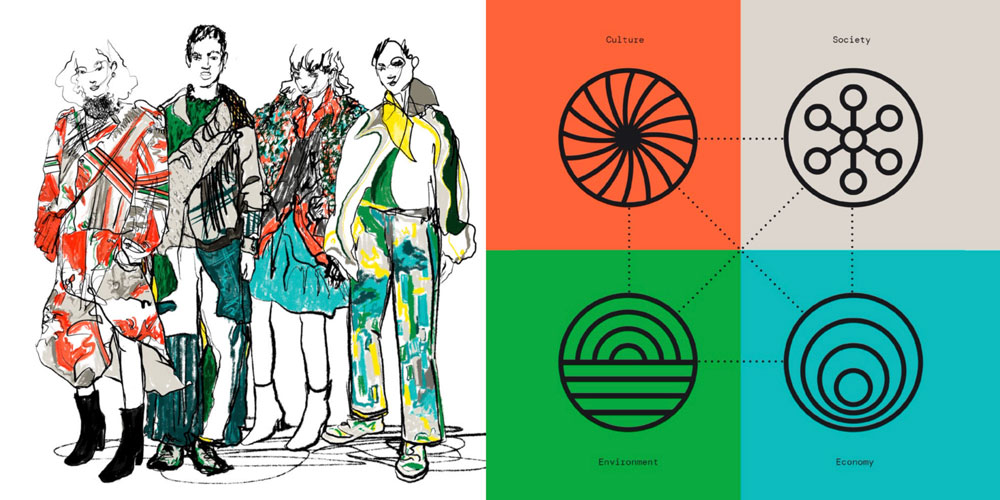Sustainable fashion designers inspiring policy change: how enterprises can be supported for a sustainable future
The vast majority of discourse on social and environmental prosperity in the fashion sector focuses on large scale industry, missing out on the importance, relevance and potential of MSEs to sustainable prosperity. A policy briefing launched by the Fostering Sustainable Practices project identifies a range of alternatives.

There is a sustainable alternative for fashion and innovative fashion designers are showing how it can be done. They also show what government needs to do to encourage this sector to contribute to sustainable prosperity.
Our work with some of the most innovative and sustainable fashion businesses in the UK shows that fashion does not need to be about environmentally damaging garments being made in poor working conditions. Sustainable fashion design businesses can be a driver of creativity that the UK fashion industry is famous for, producing beautiful things while being sustainable. Examples include Elvis and Kresse who are taking redundant materials to produce a range of bags while sharing their profit with charitable causes. Or Finisterre who are producing sustainable outdoor wear meeting the highest standards of social and environmental performance, transparency, and accountability. Or NuW who are looking for alternative ways of giving access to fashion with their community-centred online platform to share and swap clothes with other NuW members.
The 48 design-led and service businesses participating in the Fostering Sustainable Practices project, identify a set of good practices to be supported and point out opportunities for policy to address constraints.
There is a need for government to act now so the UK sustainable fashion industry can flourish and be a central part of greening the build back. A policy briefing launched by the Fostering Sustainable Practices project identifies a range of policy options that could be implemented as a way to tackle the climate and ecological emergency and address social issues.
Firstly, the Government’s Industrial Strategy needs to give greater attention to sustainable fashion as an emerging sector where the UK can be a global leader. These businesses are operating across the country but more support is needed to encourage more employment creation in areas of deprivation, developing a sustainable economy that will help the UK Build Back Better.
Secondly, the sustainable fashion businesses want a level playing field and for other businesses to meet the standards they are upholding, such as reduced waste and decent work standards. This requires enforcing regulation in the UK and ensuring that imports meet these same standards – otherwise the UK is simply exporting problems and contributing to global environmental damage.
Thirdly, sustainability is shown to come from changes in consumer behaviour, and the government can help encourage this – for example removing VAT on repair services, tax incentives, e.g. for the use of recycled or waste materials and supporting the development of a consumer labelling system for sustainable products.
Fourthly, policy can encourage business support so that sustainable innovations can be scaled up. Advice and other support for growing businesses can help them reach bigger audiences and have bigger positive impacts on people and the planet. Many participating businesses wanted to stay small themselves, but their passion for change resulted in them wanting to encourage the scale out of more start-ups to replicate the ways they address sustainability. So there is a need for start-up support and incubation that learns from the existing good practice. For some businesses there is trouble getting access to repayable finance for scaling up when in the early stages, and there is role for government funds to support lending and equity where it has a sustainability objective alongside commercial returns.
Fifthly, many of the sustainable fashion businesses had benefited from innovation grants, and these can be expanded where they make contributions to the UK’s targets for Net Zero as well as economic recovery. Likewise, there is a need to have skilled workers in the sector and lifelong learning both within traditional education but also beyond school and college.
Finally, sustainable fashion businesses show how success is not just about financial returns and contribution to GDP growth. They are concerned that crude visions of economic growth are driving businesses to be even more unsustainable with long term implications. They have a sophisticated view of sustainable prosperity that brings together business, creativity, good work and consideration for the environment. Planning and assessing policies for a sustainable economy therefore needs to mirror this and move beyond simple economic indicators.
Links
The policy note is available for download in pdf. The comprehensive ‘Fashion As Sustainability In Action’ guidebook can be accessed via the project hub at www.sustainable-fashion.com/fsp
About the project
The FSP project investigates the creative and business practice in fashion design-led micro and small enterprises as a potential driver for change towards a more sustainable future. The project team is led by Centre for Sustainable Fashion with partners from Middlesex University and The Open University. Fergus Lyon is a professor at Middlesex University and Deputy Director of CUSP.



